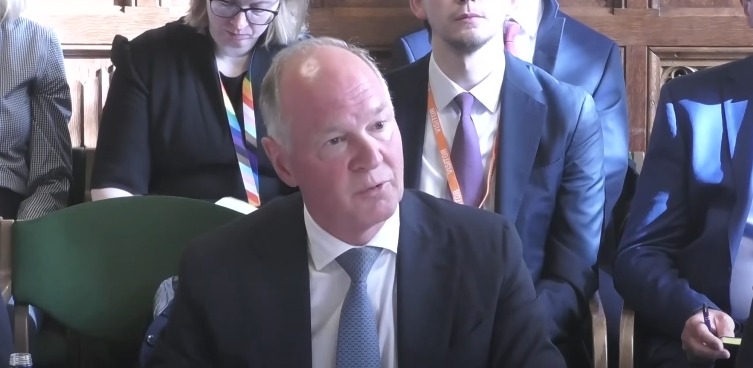Heathrow Airport CEO Thomas Woldbye’s £3.2 million compensation package, which includes a £2.2 million bonus, has garnered a lot of attention. Particularly in view of the recent airport crisis, his compensation has drawn criticism and generated discussions. Since taking office in 2024, Woldbye has become a focal point of discussions about executive pay in the aviation sector. Although he has led Heathrow through some of its busiest times, his performance lately amid the March 2025 fire incident has sparked fresh debates about the fairness of his compensation, particularly in light of the issues the airport has encountered while he has been in charge.
A fire that broke out in one of Heathrow’s biggest electrical substations recently forced the airport to close, bringing attention to Woldbye’s response. In addition to leaving travelers stranded and causing a major safety scare, the incident raised serious concerns about how critical infrastructure is managed. Even though Woldbye is still in charge, his response to the crisis and the sizeable bonus he received have prompted calls for a closer examination of top-level pay. It is evident that Woldbye’s duties as an executive go beyond daily operations and include public relations, crisis management, and upholding the airport’s reputation. However, given the recent events and the substantial public disruptions brought on by the fire, many have begun to wonder if such a salary is warranted.
| Personal Information | Details |
|---|---|
| Full Name | Thomas Woldbye |
| Nationality | Danish |
| Position | CEO of Heathrow Airport |
| Annual Salary | £3.2 million (including £2.2 million bonus) |
| Estimated Net Worth | £5 million to £10 million |
| Previous Experience | Held executive positions in seven companies |
| Current Position Since | 2024 |
| Thomas Woldbye LinkedIn Profile |
Particularly in vital industries like aviation, the connection between high executive compensation and performance is coming under more and more scrutiny. Although Thomas Woldbye’s compensation is in line with industry norms, it poses a crucial query: Should an airport’s performance—especially during a crisis—be correlated with such high compensation? Since the aviation industry has always been high-stakes, its executives are frequently paid well in proportion to the enormous amount of responsibility they bear. But when things go wrong, the question is whether they are making these huge profits because of their adept leadership or because they are just profiting from the operation’s size.

John Holland-Kaye, Woldbye’s predecessor, received comparable compensation, indicating similarities between the two in terms of pay scale. Although both CEOs were in charge of vital operations, major crises put their leadership philosophies to the test. Woldbye sees the recent Heathrow substation fire as a direct challenge to his leadership skills. Although executive compensation in the aviation sector has stayed high, there is growing support for the idea that it ought to be more clearly linked to performance. Critics are putting more and more pressure on executives to be paid according to their leadership’s long-term viability and crisis management skills, in addition to their positions.
Other CEOs of significant international airports, like those at Los Angeles International and John F. Kennedy International, have comparable compensation packages. These jobs are naturally well-paid because they require extraordinary supervision of vital infrastructure. But as Woldbye’s case demonstrates, there is frequently a gap between the benefits of overseeing significant international operations and how those operations affect regular travelers. In a time when accountability, transparency, and performance evaluation are becoming essential components of corporate governance, the public has started to wonder if such high compensation is warranted, particularly when affected by service failures.
Furthermore, sustainability is taken into consideration when assessing Woldbye’s leadership. As pressure to cut emissions and move toward greener operations grows, Heathrow’s leadership now has to balance environmental objectives with corporate expansion. In addition to overseeing airport operations, Woldbye’s strategic direction focuses on adjusting to the aviation industry’s increasing emphasis on sustainability. Given the growing pressure on the industry to strike a balance between operational success and environmental responsibility, his choices in this area may ultimately determine his leadership legacy in the long run.
Executives like Woldbye are being closely watched for their operational choices as well as their capacity to handle the evolving global travel scene, particularly in relation to issues like warming temperatures and the environmental effects of aviation. Woldbye’s large compensation package might be viewed as a reward for effectively handling one of the most difficult industries in the world if he can guide Heathrow to become a more environmentally friendly operation while preserving its position as a major international hub. On the other hand, if these problems are not adequately resolved, his leadership and compensation may come under more scrutiny.
As public expectations for corporate accountability continue to rise, it is anticipated that the discussion surrounding the compensation of executives such as Woldbye will become more heated in the years to come. Discussions about Woldbye’s pay equity are likely to continue in the wake of the March 2025 Heathrow crisis, especially since they speak to larger societal concerns about accountability, transparency, and fairness in the corporate sector.
By analyzing Thomas Woldbye’s pay, leadership style, and the evolving demands on the aviation industry, the discussion shifts from focusing solely on one executive to addressing the larger trend of corporate responsibility and the social role of large infrastructure firms. In addition to being a source of controversy, Woldbye’s compensation offers a prism through which to examine the changing demands made on those responsible for providing basic services. It will be interesting to observe how executives like Woldbye modify their tactics as sustainability, crisis management, and accountability emerge as crucial standards for assessing leadership—and whether their pay reflects these changing priorities.


